| |

Traditions, folklore, history and more. If it's Irish, it's here. Or will be!
"People will not look forward to posterity who never look backward to their ancestors."
-Edmund Burke

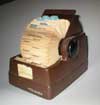


Quotes
Library: Books, Movies, Music
Prints & Photos
Poetry
Jokes


Shops Ireland
Bunús na Gaeilge
(Basic Irish)
Circle of Prayer
Blessings
Did You Know?
Himself/Herself
Write to Us
Readers Write..
Links/Link to Us
Advertise with us
Awards & Testimonials
Submissions Guide

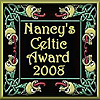
|
|
|
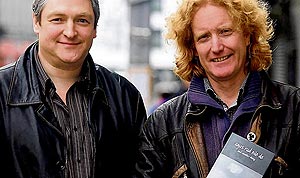 agus rud eile de - and another thing book & CD agus rud eile de - and another thing book & CD
by William Ramoutar
I was never too hot on the ould poetry in school. I liked some of it, don't get me wrong, but most of it was useless. At least to me. Well, that was then. I got Louis de Paor's "agus rud eile de" in my hands last week and I have to tell you, it was like one of those breezes on a summer day, or not even summer, but any day - where the breath of the air invigorates your whole system and wakes you up, from whatever rock you've been living under, or cave you've hibernated to.
Louis is a fluent Irish speaker, who teaches, writes and enunciates our language so beautifully that you regret all the times in school when you had to be beaten back into the present, because the language, to so many of us, was a barrier. It was the difference between the Townies (Jackeens) and the country people. I know the slang word, I don't use it any more, because I was actually one of the rural folk. It was a hurtful name back then. My family travelled the roads of Ireland with Circuses and Amusements for the first ten years of my life.
It was a different time, and the guttural voices of the Towns in those days was because of the Irish that was spoken there. It was in many cases rough, edgy, bordering on alien even - because it was not too long since the Gaeltacht areas were respected and Irish was the only language spoken there. Up in Dublin, Irish was belted into the students in the National Schools, but rarely used after you left the wooden desks for the business world. Mind you, you were almost certain of a job if you "had the Irish," so many from outside of Dublin made sure their future was assured, with good pay and benefits the rest of their life, because of just that. A lot of resentment was realized too, just from that fact. Dubliners were suspicious even of their fellow countrymen, so to hear Louis' offering is enlightening to me, and I was one of those stubborn bone-headed students. I think it was totally uncool too, in those far off days, to learn the language. I mean when I moved “up” to Dublin, you didn't even want your new Neighbours, or fellow School-goers, to know you had left that life behind.
 The spoken word here is Louis' poems, and they have a life all their own because of the powerful understanding of his writings. Yes, certainly, but also his joy at using the strength and surety of the sound of the words. It is beautifully atmospheric, from the rustling of the trees in the wind, to the breathiness of the Whistles. To the earthy sound of male and female Irish vocals and Louis' marvellous enunciation. I left Ireland 25 years ago. I didn't really want to, but as I said, times were different, times were hard. Now there is this resurgence in the Irish language and there are people all over the world who want to learn it. Fantastic! I believe for artists such as de Paor it must be a dream come true to see this happen. His love of the language is evident from the first few words on this recording, but you don't understand the words? Don't worry. In my mind that is not what this recording is all about. It is in the delivery of the work. From the joy in his voice, the energy, the enthusiasm, the vision of the green fields, the swaying trees, the pounding of the Atlantic surf off the rocky coast, all come from this collaboration. Yes it is such. The spoken word here is Louis' poems, and they have a life all their own because of the powerful understanding of his writings. Yes, certainly, but also his joy at using the strength and surety of the sound of the words. It is beautifully atmospheric, from the rustling of the trees in the wind, to the breathiness of the Whistles. To the earthy sound of male and female Irish vocals and Louis' marvellous enunciation. I left Ireland 25 years ago. I didn't really want to, but as I said, times were different, times were hard. Now there is this resurgence in the Irish language and there are people all over the world who want to learn it. Fantastic! I believe for artists such as de Paor it must be a dream come true to see this happen. His love of the language is evident from the first few words on this recording, but you don't understand the words? Don't worry. In my mind that is not what this recording is all about. It is in the delivery of the work. From the joy in his voice, the energy, the enthusiasm, the vision of the green fields, the swaying trees, the pounding of the Atlantic surf off the rocky coast, all come from this collaboration. Yes it is such.
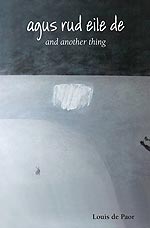 The first Uilleann Piper who performed with the jewel in the Celtic Tiger’s crown - Riverdance - and here he is, tucked into the back cover of the book on a cd. Ronan Browne, now 16 years since his emergence on that show, as one of Ireland’s most talented musicians on woodwinds and elbow driven instruments. He is here to complete your picture. The glorious sound of the Pipes bursting through the clouds. Tin Whistles and Wooden Whistles swirl the wind and the trees. I never left twenty five years ago...... I hear "The Flower of Magheralley-O" on here on this cd and I am home again. Ronan's sense of accompaniment compliments richly Louis's lines and is such a benefit to these offerings. I would say his playing equals the lush majesty of the poetic landscapes. The true mark of a master musician, I have always heard, how they can carry the work of their counterpart but never overpower them. Ronan is that man. His mastery of his instruments is second to none and evident here. But his empathy is what stands out. I don't pretend to understand the words in the poems. In essence, we don't need to, because the English translation is on the opposite page to the Irish in the book. But maybe it's the air that Browne breathes through whatever he is playing, that brings the words and thoughts of Ireland to life. The Ancients walk the fields once more, boat the seas, stand overlooking the cliffs and centuries of these elemental surroundings cast us into the frame. This is as much a work of fine art as that it portrays the language as a purveyor of dreams, love, wit and devilment. The first Uilleann Piper who performed with the jewel in the Celtic Tiger’s crown - Riverdance - and here he is, tucked into the back cover of the book on a cd. Ronan Browne, now 16 years since his emergence on that show, as one of Ireland’s most talented musicians on woodwinds and elbow driven instruments. He is here to complete your picture. The glorious sound of the Pipes bursting through the clouds. Tin Whistles and Wooden Whistles swirl the wind and the trees. I never left twenty five years ago...... I hear "The Flower of Magheralley-O" on here on this cd and I am home again. Ronan's sense of accompaniment compliments richly Louis's lines and is such a benefit to these offerings. I would say his playing equals the lush majesty of the poetic landscapes. The true mark of a master musician, I have always heard, how they can carry the work of their counterpart but never overpower them. Ronan is that man. His mastery of his instruments is second to none and evident here. But his empathy is what stands out. I don't pretend to understand the words in the poems. In essence, we don't need to, because the English translation is on the opposite page to the Irish in the book. But maybe it's the air that Browne breathes through whatever he is playing, that brings the words and thoughts of Ireland to life. The Ancients walk the fields once more, boat the seas, stand overlooking the cliffs and centuries of these elemental surroundings cast us into the frame. This is as much a work of fine art as that it portrays the language as a purveyor of dreams, love, wit and devilment.
 The music is the partner that breathes the life into this work. There are many gifts to enjoy here. Some traditional airs and some original, there is also a Scottish tune that is given a new lease on life, "Ailein Dhuinn," Scots Gaelic for “dark island.” Sung here by the powerful Sean Nós singer, Naisrín Elsafty. There is another sung by Zahrah Elsafty and how talented this family is. Emanating from on the one hand their Mother, Irish singer, Treasa Ní Cheannabáin and of course they get their last name from their Egyptian Father, and have inherited his family’s rich deep musical roots. Although there is nothing dark about the final product, I dare say, we all take something different from the poems, the music, the way we feel a certain day. This is indeed "another thing". A very special thing that I will certainly treasure as it transports me to the old fields I trod. The ways of old Ireland, the people and the places. Sure it is a leap of faith for you, as the words are foreign, but you will get the reward. The reward - "and another thing", agus rud eile de The music is the partner that breathes the life into this work. There are many gifts to enjoy here. Some traditional airs and some original, there is also a Scottish tune that is given a new lease on life, "Ailein Dhuinn," Scots Gaelic for “dark island.” Sung here by the powerful Sean Nós singer, Naisrín Elsafty. There is another sung by Zahrah Elsafty and how talented this family is. Emanating from on the one hand their Mother, Irish singer, Treasa Ní Cheannabáin and of course they get their last name from their Egyptian Father, and have inherited his family’s rich deep musical roots. Although there is nothing dark about the final product, I dare say, we all take something different from the poems, the music, the way we feel a certain day. This is indeed "another thing". A very special thing that I will certainly treasure as it transports me to the old fields I trod. The ways of old Ireland, the people and the places. Sure it is a leap of faith for you, as the words are foreign, but you will get the reward. The reward - "and another thing", agus rud eile de
Book & CD is available from Cló lar-Chonnachta
Also Pipers Ireland
Book only - available on Amazon
Photo Credit: Louis de Paor & Ronan Browne: Irish Times/Seán Ó Mainnín
Photo Credit: Open Book: Ronan Browne
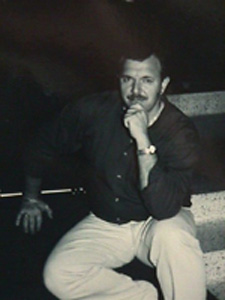 BIO William Ramoutar BIO William Ramoutar
IRISH WAYS RADIO PROGRAMME
WFCF Radio 88.5 FM
Every Sunday 11:00 am to Noon eastern standard time on the radio WFCF 88.5fm
We are now an iheart Station on your smartphone or computer
streaming live on iheart.
Review written by William Ramoutar Presenter of Irish Ways Radio Programme, St Augustine Florida
|
|
Fri, Sep 27, 2024
 The Galway Hooker The Galway Hooker
This unique vessel, with its distinctive curved lines and bright red sails, originated in the village of Claddagh. During the 19th century, hookers supported a significant fishing industry and also carried goods, livestock and fuel. Seán Rainey is remembered for building the last of the original boats, the Truelight, for Martin Oliver who was to become the last king of the Claddagh; as king, he was entitled to white sails on his boat. Since the mid seventies, many of the old sailing craft which were on the verge of extinction have been lovingly restored and new ones have been built. During the summer months they can be seen at festivals such a Cruinniú na mBád - the Gathering of the Boats - in Kinvara.
Click for More Culture Corner.
Derek Bell recorded Carolan's Receipt in 1975, the same year he joined the Chieftains. The selections include "Sídh Beag agus Sídh Mór," the first melody O'Carolan composed, as well "Carolan's Farewell to Music," which was his last. There have been dozens of settings of O'Carolan's compositions released since these, but none have surpassed the beauty of Bell's.
Michael Simmons
See our Article on O'Carolan
Click here for Carolan's Receipt.
|
|
|




 The Galway Hooker
The Galway Hooker